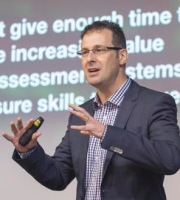There is an upside to education having languished so long in the 20th Century. It gives teachers a generous chance to exceed our students’ expectations and make their learning experience worth talking about.
Those teachers who embrace new media still have the chance to surprise their students. The tools are simple and powerful for enhancing class dynamics, yet at the same time, the expectations of students that their teachers will use them are still low. There has not been such a favourable conjunction of circumstances this easy to exploit for at least two decades (since I started teaching), and it won’t last five years from now, either. This could well be the best window of opportunity this generation will get to so easily teach in ways that students think remarkable.
In industries that responded swiftly to new media (several years ago) the curve has already begun to stabilise. The first restaurants to establish Facebook and Twitter profiles (for example) made impressive gains because they were among the few doing it. At the time most businesses failed to foresee the potential of social networks but once the benefits on the bottom line were reported, more and more restaurants started jumping on the bandwagon. Nowadays, most restaurants have a Facebook and Twitter presence. They can’t afford not to because the public expects it. It does not make them look particularly cool though. There is no longer much cachet in it.
At school though, in 2012, it will still be possible to use new media to be surprising because most students still won’t be expecting it. This will only be true for as long as few teachers communicate with their students in ways that are generationally relevant. But as more and more teachers do, (and they will/are) the curve of student expectations will inevitably shift. When that happens, education in Australia will of course be the better for it. Between now and then, though, we shouldn’t take for granted the exciting opportunity we have to delight our students.

Hi Andrew,
I have shared this article with the students I am working with at Deakin Uni. They are doing a Dip Ed and will be graduating in 2012. I have been telling them they are in the perfect position to make a change and this article explains why very nicely!
http://grad-dipdeakin.posterous.com/the-upside-of-schools-failure-to-move-with-th
Thanks!
Kath
Dear Andrew,
Is this what they call the “low hanging fruit” of education? I think it is a wonderful, exciting time to be a teacher and I look forward to students driving the changes that will occur in schools around Australia. Although we are walking a fine line between meeting the external demands of VELS, the Australian curriculum, NAPLAN, MySchool data, VCE exams and standardized testing and meeting the needs and interests of students, with effective use of various technology and good planning, it is achievable. I think we need to change the ways that we measure success in schools, so that the ‘happiness index’ and citizenship, finding their “Element” (Ken Robinson) and advocating for a sustainable society are all components of schools that are considered successful.